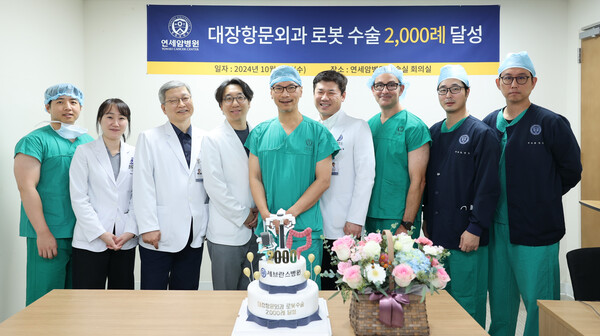The colorectal surgery department at Yonsei Cancer Center reached a significant milestone on Oct. 30, completing its 2,000th robotic surgery.
The milestone patient, a 71-year-old woman receiving treatment for stage 3 rectal cancer, successfully underwent the procedure and is now recovering ahead of her discharge.

According to the National Cancer Information Center’s 2020 statistics, colorectal cancer is the second most common cancer in Korea, accounting for about 11 percent of all cases. Over 28,000 people are diagnosed with colorectal cancer each year, and tumor removal surgery is considered the most effective treatment.
Robotic surgery has become a highly effective option in these cases. With an incision of less than 1 centimeter, a small robotic arm is inserted into the body, leaving minimal scarring and reducing patient burden. A high-resolution camera allows the surgeon to remotely control the robotic arm, precisely targeting the treatment area.
Yonsei Cancer Center's colorectal surgery department performed Asia’s first robotic surgery for rectal cancer in June 2006. Just a year later, they completed 100 robotic surgeries for rectal cancer, establishing the standard for robotic surgery in colorectal and rectal procedures in Korea. Since then, they have primarily used robotic surgery for colorectal and rectal cancer patients, later expanding to include inguinal hernia surgeries.
“Robotic surgery is an innovative approach that offers patients a more precise and safer treatment,” said Professor Hur Hyuk of the colorectal surgery department. He added that the team will continue to adopt the latest technologies to provide the best treatment experience and set new standards in colorectal and rectal cancer care.
Severance Hospital has been a driving force in the growth of robotic surgery in Korea since performing the country's first robotic procedure in 2005. The hospital now operates 10 surgical robots, including the da Vinci SP for single-port surgery, the da Vinci Xi, and Meere Company’s Revo-i. Last year, Severance set a global record with 40,000 robotic surgeries performed by a single institution.
Related articles
- Severance Hospital tops NCSI rankings for healthcare service for 14 consecutive years
- Debunking myths about colorectal cancer: expert clarifies misconceptions on constipation, polyps, and diet
- ‘Inoperable colorectal cancer patients can now live 20-50 months longer’
- Severance Hospital suggests precision immunotherapy for HPV-positive head and neck cancer
- Yonsei Cancer Center starts heavy ion therapy for pancreatic, liver cancer patients
- Severance Hospital launches fast-track treatment program for melanoma patients
- Medtronic opens Korea's 1st robotic surgery research and training center in Osong
- [Interview] 'TNT reimbursement boosts expectation for cure of rectal cancer'
- Yonsei study links low muscle density to worse treatment outcomes in breast cancer
- Yonsei researchers discover how gut microbes regulate gastric stem cells
- Colorectal cancer risk linked to diet, inactivity—experts stress prevention
- Bucheon St. Mary's Hospital tops 1,000 robotic surgeries in 2 years

